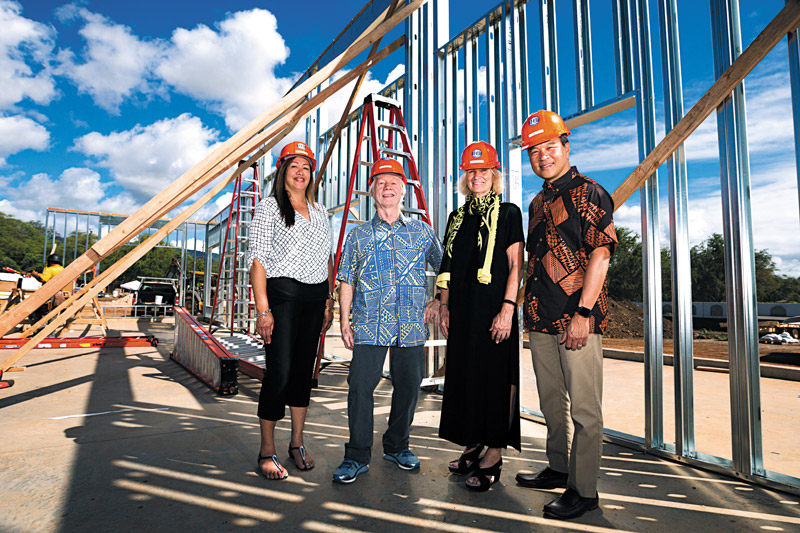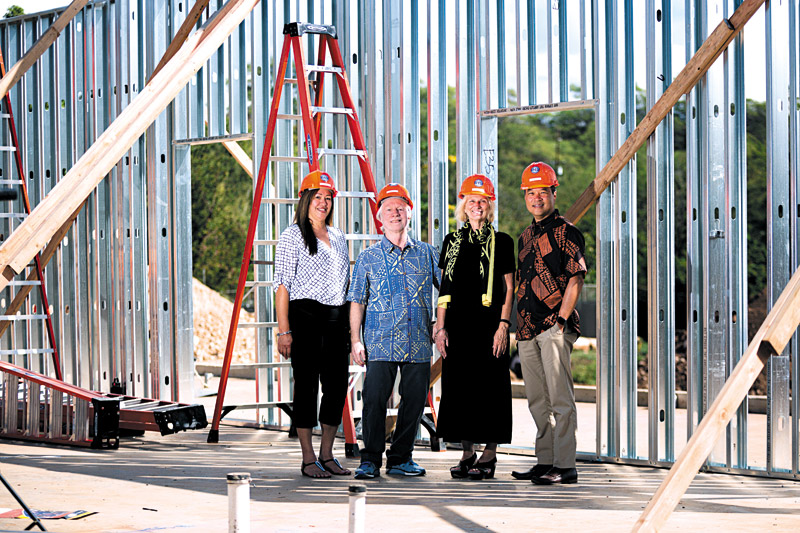The House That Love Built

Visiting the under-construction Hale Kipa facility in ‘Ewa Beach are Stacy Peiler, emergency shelter and community-based outreach and advocacy program coordinator; Punky Pletan-Cross, president and CEO; Jaque Kelley-Uyeoka, deputy CEO; and Scott Seu, board chairman.
Even after a half-century of service, Hale Kipa — or “House of Happiness” — remains completely devoted to improving the lives of Hawai‘i’s at-risk youth.
It is said that youth is not a time of life but a state of mind. No one understands that better than the folks at Hale Kipa, where for a half-century they have focused on the affectations of adolescents.
Started in 1970 as a shelter for runaway girls, the social services organization has evolved into a valued community resource that addresses troubled teens and their protective environments.
As Hale Kipa president and CEO Punky Pletan-Cross puts it, “There is no such thing as incorrigible youth. We see them as bundles of potential.”
That’s putting a positive spin on what child development experts view as the most challenging and complex stage of human growth. Adolescence, the phase between childhood and adulthood, is a stressful period, characterized by discernible physical, mental, emotional, social and behavioral changes.
Parents might dread a child’s terrible twos, but what about the traumatic teens?
Hale Kipa can attest that adolescence is the most vulnerable time of life. It has extensive experience working with at-risk youth to prove its point. Whether adolescence — ages 10 to 24 — is a rite of passage or its own dramatic journey, morphing into adulthood can be a rough road.

Checking on the progress of the 4.3-acre Harry and Jeanette Weinberg multipurpose campus in ‘Ewa Beach are Stacy Peiler, emergency shelter and community-based outreach and advocacy program coordinator; Punky Pletan-Cross, president and CEO; Jaque Kelley-Uyeoka, deputy CEO; and Scott Seu, board chairman.
If it is paved with pain from a broken home, troubled family relationships, violence and abuse, the human spirit is destroyed, and it’s easy to lose control. That’s when intervention is needed along with utmost parental care, guidance and empathy, according to Pletan-Cross, who has directed Hale Kipa since 1998.
ADVERSITY’S ADDRESS
According to the National Runaway Safeline, between 1.6 million and 2.8 million youth run away each year in the United States. Children depart as early as ages 10-14. The youngest are the most at risk for the dangers of street life. Seventy-five percent of runaways are female.
In Hawai‘i, Hale Kipa has served more than 45,000 youth since its inception. It works with public and private agencies to provide residential, outreach and foster care services at no cost. Partners include Honolulu Police Department, Family Court, Child Welfare Services and Junior League, among others.
The nonprofit provides a “time out” for troubled teens to get out of the fray and work on a recovery plan. While offering stays in shelters from one day to several months, its goal is ultimately to return a child to their home.
An agency that calls itself Hale Kipa — “House of Happiness” — surely knows something about doling out promising outlooks and hope. As it responds to clients’ needs, it perfects modes of coping, connecting and mastering change.
In these perilous times, it’s useful to shine the light on community safety nets that redeem human lives and reassure us that solutions exist. Too often hard-working yet humble agencies operate out of range of community awareness and recognition. It’s understandable given the age and confidentiality of their target population.
MAJOR MILE STONE
But for Hale Kipa, reaching 2020 is a major milestone in its history. In a few months, it will move its operations and headquarters to new facilities on Old Fort Weaver Road in ‘Ewa Beach. The 4.3-acre Harry and Jeanette Weinberg multipurpose campus will be within reach of its clientele, who are predominantly from O‘ahu’s central and leeward areas.
Ironically, an agency that touts the value of a solid home has been without one all these years. But thanks to $11.6 million in hard-earned corporate and foundation funds, its dream of an integrated administrative, residential, service and education center is being realized.
Hale Kipa deputy CEO Jaque Kelley-Uyeoka has watched the agency grow and evolve in her 40-year tenure.
“Our wraparound approach provides our youth a multitude of services as well as connects them to community resources beyond our expertise,” she explains. “We holistically tackle our youths’ needs. Programs, such as emergency shelter, foster care, independent living and outreach, build off one another and fill in service gaps to ultimately help youth reach their big-picture goals.
“I love working with teenagers. They’re just the most fun,” the University of Hawai‘i graduate adds. “But it’s not about us — it’s about them and their journey. With rapport comes trust.”
IN GOOD WE TRUST
Trust is the gold standard of social work. While there is a dire need for more social workers, Kelley-Uyeoka laments the inequities still inherent in the profession.
“Our clients have numerous challenges, ranging from drugs to poverty and crime. Social workers in general face a lack of decent salaries that would encourage people who would make awesome social workers to consider and stay in the field,” she asserts.
One staffer who exemplifies achievement in the field is Stacy Peiler, program coordinator of Hale Kipa’s emergency shelter and community-based outreach and advocacy. The Leeward Community College graduate has worked with at-risk youth for more than 20 years.
“I love working with teenagers, and I love advocating for them,” she says. “We treat kids as if they are our own despite their history. Local kids are shy; they don’t ask questions. You have to take their hand, walk with them, and be by their side all the way. We check our judgments at the door.
“All they want is love, attention and direction, like everybody else,” she professes.
Underscoring that premise is Scott Seu, Hale Kipa board chairman and senior vice president of public affairs at Hawaiian Electric Co.
“I am amazed at how the leadership and staff here accomplish so much with the various programs and processes involved, especially as things change rapidly,” he says. “Board members help guide policy and direction, enhance support in the communities, and serve as a sounding board for major decisions.”
Of Hale Kipa’s move to West O‘ahu, he asserts, “Completing the facility and transitioning the organization there represents a great opportunity to reinvigorate and strengthen the identity of Hale Kipa and have a piko, or center, for the youth and staff.
“It’s a home where the light is always on,” Seu says.
Hale Kipa currently has a house for boys, a house for girls, and a shelter for victims/survivors of sex trafficking. All are licensed eight-bed facilities. The agency is planning another shelter for girls.
TRAUMA THERAPY
According to Pletan-Cross, whose nickname Punky originated in his childhood in North Dakota, there has been a key shift in youth protective services in the last 20 years.
“Trauma is a critical dynamic that we have come to understand and address,” he explains. “We recognize that youth, particularly among the homeless, develop a series of behaviors in response to trauma. Self-soothing behaviors, such as taking drugs or even cigarette smoking, are self-protective measures as a result of trauma.
“This has changed the field significantly. It acknowledges that everyone experiences trauma differently. We spend a lot of time looking for the right keys to open the doors of truth and solutions.”
Trauma can be experienced directly or vicariously, Pletan-Cross claims.
“You might be in a family of domestic violence, but may not be the beating victim,” he says. “If you happen to be around trauma, you can absorb it.”
Young people move in and out of numerous settings — familial, institutional, informal and virtual. Each of these, Hale Kipa staffers say, is an opportunity for development, derailment or both. Yet they know that young people don’t grow up in programs; they grow up in communities.
“While we will not and should not always have control over adolescents, we can shape the settings where they spend time,” Kelley-Uyeoka says.
She professes that cognitive development doesn’t stop when the school bell rings, and social development doesn’t kick in upon arrival at the teen center.
“It’s the responsibility of practitioners, advocates and policy makers to prepare young people for college, work and life,” she adds.
As Hale Kipa crosses the threshold to its next 50 years of service to youth, it will do so with renewed commitment and dedication.
“Our goal is to put ourselves out of business,” says Pletan-Cross.
Yet in providing roofs over the heads of troubled teens, it serves a noble mission of being the house that love builds. It’s a solid foundation.






